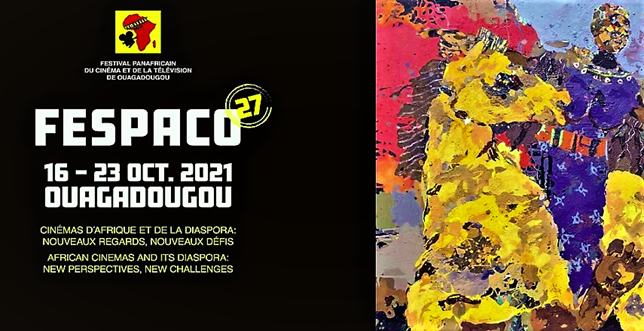Abuja, October 1, 2021 (Innocent Iroaganachi, SIGNIS Correspondent). The 27th African International Film Festival, presented by FESPACO — the Pan – African Film and Television Festival of Ouagadougou (Festival Pan – Africain du Cinéma et de la Télévision de Ouagadougou). The event was initially scheduled to take place on February 27 – March 6, but had to be delayed because of the coronavirus pandemic. It now will take place on 16-23 October 2021 in Ouagadougou, the capital city of Burkina Faso, West Africa.
The 2021 edition of FESPACO event is set to feature Seventeen films in the October competition for the top prize at the Africa’s top cinema and TV festival. The directors of the 17 films to be featured in the festival are from 15 countries across Africa, including one from the host nation, Burkina Faso. Egypt has two contenders, while, Angola, Cameroon, Chad, Ivory Coast, Lesotho, Morocco, Namibia, Nigeria, Rwanda, Senegal, Somalia, Tanzania, and Tunisia, have one contender each.
The spokesman for the government, Ousseni Tamboura, affirmed in a press conference on 6 April the cabinet’s decision to reschedule the festival under some health and safety guidelines.
Attendees at the event will be expected to observe social distancing and adhere to stipulated precautions to prevent the spread of COVID-19. The number of invited guests is also limited to 150, according to the Minister of Culture, Elise Thiombiano, to help reduce infection risk. Also, the opening ceremonies, which usually take place at the city’s Joseph Conombo municipal stadium, will take place in Ouagadougou’s Palais des Sports, a 5,000-seat stadium. These measures are among the guidelines put in place by the government to further protect festivalgoers and maintain safety standards throughout the event.
The theme for the Fespaco 27th edition is “Cinemas of Africa and the Diaspora : New Perspectives, New Challenges.” Irrespective of the current security and health challenges, the organizing committee aims to accomplish a lot through the event, through activities, such as the usual cinema and television market, professional meetings, as well as screenings in theatres open to the public. In the same spirit, films chosen for competition are expected to be primarily produced in Africa and made by Africans.
In presenting the revised plans, Alex Moussa Sawadogo, the festival’s director and the new general delegate of FESPACO, emphasized that this year’s edition is a “challenge to show, despite the health situation, that the continent continues to create, to dream, to be able to resist all the evils which undermine our societies.” The festival will provide much-needed innovations with a new section entitled Burkina, which will “…show the dynamics of the film industry…” in the host country, Burkina Faso. Mr. Sawadogo expects that the event will “become a hub where all the artistic creations of the African continent can be found and, beyond that, to attract other international platforms.”
The seventeen feature films chosen from among 1,132 entries for the festival’s main competition, competing for the Golden Stallion of Yennenga for best film are: Air conditioner , by Mario Bastos (Angola); Baamum Nafi , from Mamadou Dia (Senegal); Bendskins (Moto Taxi) , by Narcise Wandji (Cameroon); Eyimofe (This is my desire) , by Chuko Esiri (Nigeria); Farewell Amor , by Ekwa Msangi (Tanzania); Feathers , by Omar El Zohainy (Egypt); Freda , by Gessica Geneus (Haiti); The Gravedigger’s Wife , by Ahmed Khadar (Somalia); Night of the Kings , by Philippe Lacôte (Ivory Coast); Les Trois Lascars , Boubakar Diallo (Burkina Faso); Lingui, the sacred ties , by Haroun Mahamat-Saleh (Chad); Nameless (The Anonymous) , by Wa Nkunda Mutiganda (Rwanda); Oliver Black , from Tawfik Baba (Morocco); Souad , by Amin Ayten (Egypt); The White Line , by Desireee Kahikopo-Meiffret (Namibia); This is not a burial, it is a resurrection , by Jeremiah Lemohang Mosese (Lesotho); and A story of love and desire , by Leyla Bouzid (Tunisia).
The event will also feature 29 entries in the short film category including both fiction and documentary, as well as 17 entrants in the television series category. The selection by an international jury of the prize-winners will be announced on October 23, with the ceremony under the direction of Mauritanian producer Abderrahmane Sissako, who won France’s coveted Cesar in 2015 for “Timbuktu”
FESPACO, the first Pan-African Film and Television Festival of Ouagadougou, was established in 1969. The name FESPACO (from Festival pan-Africain du cinema et de la television de Ouagadougou), was established at third edition in 1972. The cultural minister of Burkina Faso from 1987 to 1991, Alimata Salambere was one of the festival’s founders. On January 7, 1972, through a governmental decree, FESPACO became formally recognized as a state institution in Burkina Faso. Since then, its annual awards ceremonies have continuously been hosted at Ouagadougou, the nation’s capital. It has become a globally recognised festival, where US and European film industries flock to scout films, talent, and film proposals.


